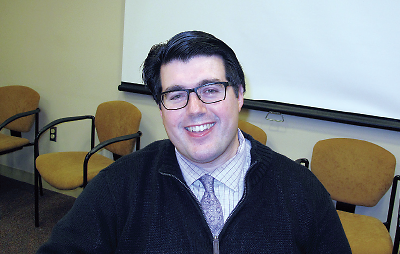Researcher/Clinician Working to Unlock Ketamine’s Mysteries
Abstract
The stars were already aligning in childhood for a boy who would eventually become “a rising star in the area of mood and alcohol disorders research.”
When Mark Niciu, M.D., Ph.D., was growing up, it looked as if the stage was already being set for his future career.

Mark Niciu, M.D., Ph.D.: “To be a good psychiatrist-scientist, you need to be passionate, inquisitive, and willing to follow unexpected findings. That was how ketamine’s antidepressant effect was discovered.”
His mother, an elementary school science teacher, ignited his interest in science. But prior to this, a terrifying encounter with a slide at age 3 awakened his fear of heights and influenced his later interest in mood and anxiety disorders.
Yet if someone had told him then that one day he would become a psychiatrist researching affective disorders, he probably would have said, “A psychiatrist—what’s that?” the 37-year-old suggested during a recent interview in his office at the National Institute of Mental Health (NIMH) in Bethesda, Md.
Niciu, an NIMH clinical fellow, works for Carlos Zarate Jr., M.D., chief of the Experimental Therapeutics and Pathophysiology Branch of NIMH. They are investigating whether the anesthetic ketamine can be developed into a safe and effective antidepressant. Although ketamine is known to relieve symptoms of both unipolar and bipolar depression within hours, its long-term antidepressant effects and safety profile are unknown.
As Zarate told Psychiatric News, “Mark is a rising star in the area of mood and alcohol disorders research. His dedication to develop better treatments for our patients is unsurpassed. The work he is conducting should provide the field with important clues to enhance our understanding of the molecular underpinnings of depression and to develop future treatments.”
Childhood Enthusiasm for Science Soared
Although Niciu’s mother had first sparked his interest in science, his enthusiasm for it was fanned during high school. “I studied biology, chemistry, and physics and enjoyed it,” he said. Then as an undergraduate at Manhattan College, he worked in a molecular genetics lab, studying human eye development, he reported. “We cloned a gene from the human retina. It was a pretty cool project for an undergrad!” At the same time he was a philosophy major, which he believes “later skewed me toward the study of the brain and psychological processes.”
“After that,” he said, “I decided that I wanted to go to medical school for the traditional reasons—to help people, to have a direct impact on other people’s lives—but also to combine biomedical research with clinical care.” In 2000, he entered the M.D.-Ph.D. program at the University of Connecticut, where he remained for eight years and obtained a doctorate in neuroscience.
When he entered clinical rotations, he said, “I was torn between neurology and psychiatry. One thing I liked about psychiatry is the intimate contact you have with patients. You really get to spend much more time with patients in psychiatry than in any other specialty. I also felt that psychiatry was in its embryonic phase compared to other areas of medicine. And coming from a neuroscience Ph.D. background, it struck me that compared to neurology, where you can locate a brain lesion and attribute it to certain signs or symptoms of a disorder, there was nothing like that in psychiatry.”
“Also during my inpatient psychiatry rotation, I saw a lot of patients with co-occurring disorders such as depression with alcoholism or schizophrenia with cocaine dependence, and little was known about how to treat these patients multimodally. This area presented an unmet need, I thought, and it sparked my interest in the neurobiology and treatment of psychiatric comorbidity.”
After graduating from the University of Connecticut program in 2008, Niciu did a psychiatry residency at Yale University. “I was in its neuroscience research training program,” he said. “It gave me a lot of protected time for research and really developed my interest in what I am doing now. Also, I became increasingly convinced that I wanted to specialize in mood and alcohol use disorders research.”
In 2010, Niciu had the good fortune of visiting NIMH as part of an outstanding resident award program for psychiatry residents. He and Zarate hit it off. So after he completed the Yale psychiatry program in 2012, he moved to NIMH to work for Zarate.
The first published study of ketamine’s rapid and powerful antidepressant effect was conducted in 2000 at Yale. In 2006, Zarate confirmed that observation and subsequently found that patients with either unipolar or bipolar depression and a family history of alcohol use disorder responded better to the antidepressant effect of ketamine than did patients with unipolar or bipolar depression without a genetic risk for alcoholism. Niciu and Zarate now want to identify the neurobiological mechanisms and biomarkers of ketamine’s antidepressant efficacy.
Ketamine Findings Surprised Him
Meanwhile, Niciu is finding his NIMH research pursuits extremely satisfying. “I am an inherently skeptical scientist,” he said, “so when I entered the ketamine-depression research field, I found it hard to believe that a medication could rapidly counter depression. But I have observed a few patients, severely and chronically depressed, almost catatonic, who responded dramatically to ketamine within only hours. It was really marvelous and melted my skepticism.”
Once patients have finished participating in the NIMH ketamine clinical trials, they can remain inpatients at the clinical research center for up to three months for standard psychiatric care. Providing them with this psychiatric care is equivalent to doing typical inpatient psychiatry, Niciu explained, and he enjoys it, he said.
But there are also challenges working as a psychiatrist-scientist, and particularly as a ketamine researcher, Niciu has found.
Getting from the initial conception of a clinical study to approval can sometimes take several years. “This is not just in the federal sector,” he explained. “It is good that there are safeguards in place for protecting patients who participate in clinical trials. But there are also a lot of bureaucratic hurdles that need to be overcome to advance clinical research.”
You also need to be willing to accept rejection as part of applying for research grants. Or as Niciu put it, “You have to be able to roll with the punches, get knocked down, brush yourself off, get up, and keep on going. Somebody who has a low frustration tolerance or a very thin skin would find it very difficult to be a successful psychiatrist-scientist in the current research climate.” He noted that while the federal budget for psychiatric research has not changed much over the past decade, “the number of researchers applying for that money has increased markedly. Thirty or 40 years ago, there was a 30 percent funding rate; now it’s 15 percent. So all psychiatric researchers have to deal with rejection at some point.”

The lobby atrium at the NIH Clinical Research Center. In spite of the center’s state-of-the-art features and the various amenities that are offered to patients who participate in clinical trials at the center, Mark Niciu, M.D., Ph.D., and his colleagues have difficulty recruiting and retaining patients for their clinical trials.
Another obstacle to conducting psychiatric research these days is recruiting and retaining patients for clinical trials. “For many patients who have jobs, kids, and other responsibilities, it’s hard if not impossible to suspend their outside lives for three to six months to participate in an inpatient clinical trial,” said Niciu. “So many of the patients we have on our unit tend to be unemployed or retired.” Niciu and Zarate have also found that once patients in a ketamine trial see ketamine’s dramatic antidepressant effects, they may terminate further participation to receive ketamine in a nonresearch setting. These ketamine clinics are providing the medication off label even though little is known about the effectiveness or safety of repeated-dose ketamine infusions, Niciu said.
Yet in spite of such difficulties, Niciu has no plans to change his direction any time soon. “I want to learn why people who are depressed and have a family history of an alcohol use disorder respond especially well to ketamine. I also want to learn how ketamine exerts its antidepressant effects on the biochemical, molecular, and cellular levels. The neurotransmitter glutamate is thought to be involved. We are now using magnetic resonance spectroscopy to study glutamate changes in the prefrontal cortex of subjects while they are receiving ketamine in the scanner. Also, scientists have already managed, in animal studies, to take white blood cells and turn them into stem cells and then differentiate them into neurons that make glutamate. I would like to study the effects of ketamine on differentiated glutamate neurons from our patients.”
“Mark is dedicated, hard working, smart, and passionate about finding a cure for depression,” Dawn Ionescu, M.D., a former NIMH colleague now at Harvard, told Psychiatric News. “Mark is also a fantastic educator as he carves out time to teach research assistants and visiting medical students. On top of all this, Mark’s approachable, friendly, and funny. … The field of psychiatry is lucky to have Mark as a promising clinician-scientist.” ■




